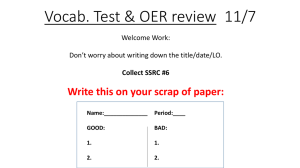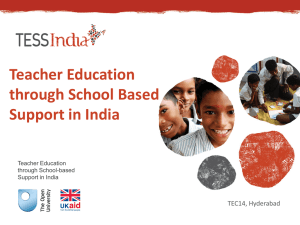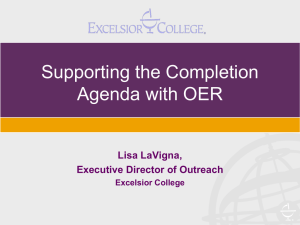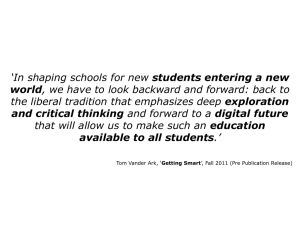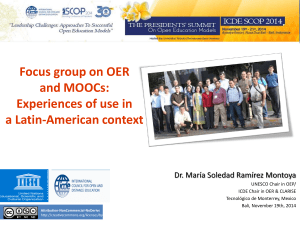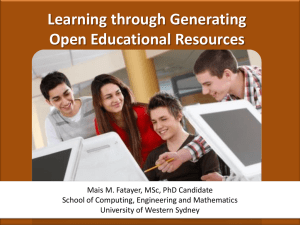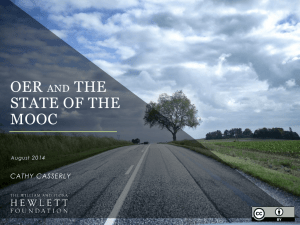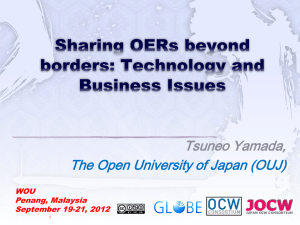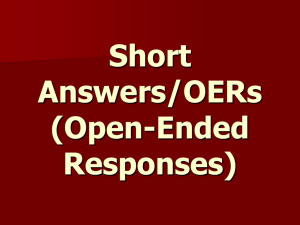IITE Concept Note for Ministers (Text)
advertisement
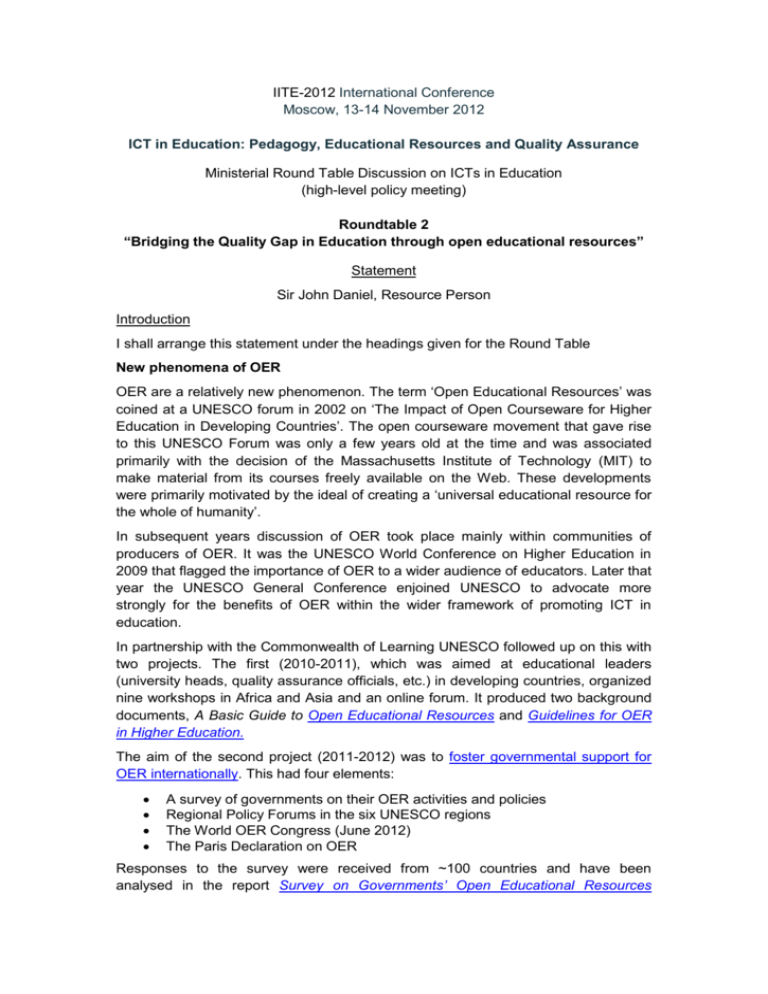
IITE-2012 International Conference Moscow, 13-14 November 2012 ICT in Education: Pedagogy, Educational Resources and Quality Assurance Ministerial Round Table Discussion on ICTs in Education (high-level policy meeting) Roundtable 2 “Bridging the Quality Gap in Education through open educational resources” Statement Sir John Daniel, Resource Person Introduction I shall arrange this statement under the headings given for the Round Table New phenomena of OER OER are a relatively new phenomenon. The term ‘Open Educational Resources’ was coined at a UNESCO forum in 2002 on ‘The Impact of Open Courseware for Higher Education in Developing Countries’. The open courseware movement that gave rise to this UNESCO Forum was only a few years old at the time and was associated primarily with the decision of the Massachusetts Institute of Technology (MIT) to make material from its courses freely available on the Web. These developments were primarily motivated by the ideal of creating a ‘universal educational resource for the whole of humanity’. In subsequent years discussion of OER took place mainly within communities of producers of OER. It was the UNESCO World Conference on Higher Education in 2009 that flagged the importance of OER to a wider audience of educators. Later that year the UNESCO General Conference enjoined UNESCO to advocate more strongly for the benefits of OER within the wider framework of promoting ICT in education. In partnership with the Commonwealth of Learning UNESCO followed up on this with two projects. The first (2010-2011), which was aimed at educational leaders (university heads, quality assurance officials, etc.) in developing countries, organized nine workshops in Africa and Asia and an online forum. It produced two background documents, A Basic Guide to Open Educational Resources and Guidelines for OER in Higher Education. The aim of the second project (2011-2012) was to foster governmental support for OER internationally. This had four elements: A survey of governments on their OER activities and policies Regional Policy Forums in the six UNESCO regions The World OER Congress (June 2012) The Paris Declaration on OER Responses to the survey were received from ~100 countries and have been analysed in the report Survey on Governments’ Open Educational Resources 2 Policies. An important finding was that: “There appears to be great interest in OER across all regions of the world, with several countries embarking on notable OER initiatives. Indeed, the survey itself raised interest and awareness of OER in countries that may not have had much prior exposure to the concept”. While the early work on OER was motivated primarily by the ideal of sharing knowledge, governments showed increasing interest in the economic justification for investing in OER as the project progressed. It therefore commissioned a report: Exploring the business case for open educational resources. The authors show clearly that using OER can reduce the cost of creating learning resources substantially. In the case of textbook production investing in OER can create considerable savings for governments and students. The Regional Policy Forums, held in the Caribbean, Africa, Latin America, Europe, Asia and the Arab States, proved to be an invaluable platform for discussions between governments and OER practitioners that did much to raise awareness of OER. Each Forum also contributed to the refinement of the Paris Declaration on OER. The Paris Declaration on OER was approved by acclamation at the World OER Congress. Challenges of open licensing One of the findings of the survey of governments’ OER activities and policies was: “…there appears to be some confusion regarding understanding of the concept and potential of OER. Many projects are geared to allowing online access to digitized educational content, but the materials themselves do not appear to be explicitly stated as OER. Where licences are open, the Creative Commons framework appears to be the most widely used licensing framework, but licensing options varies between countries”. During the Regional Policy Forums a number of governments stated that they made educational materials freely available on the Web and were surprised to discover these materials could not formally be considered as OER unless they were formally placed under an open license. In principle governments and institutions can develop their own open licensing frameworks but many have concluded that since Creative Commons has already established a framework, which it continues to refine, they can simply use that. For example, the steering committee of NPTEL, a large producer of resources in India, has recently decided formally to put its materials – some 20,000 lecture-hours equivalent – under a Creative Commons license. The Regional Policy Forums were useful in getting the message across that Creative Commons licenses, and open licenses generally, are situated within the framework of copyright legislation, not outside it. The main challenge in placing an open license on existing educational resources is the need to check whether they contain any material with a third-party copyright. If so, it must either be removed or permission sought to incorporate it in an OER. 3 Restrictions can be placed when material is put under a Creative Commons license, notably to prohibit commercial use (NC) or the creation of derivative materials (ND). It seems that these restrictions are now being used less frequently as the spirit of OER is more widely accepted. Funding Opportunities of OER Much of the early work on OER was done with donor funding, notably from the William and Flora Hewlett Foundation (WFHF), which has been committed to supporting the OER movement for over a decade. WFHF partially funded the UNESCO-Commonwealth of Learning project described above. However, the creation and use of OER cannot be sustained indefinitely through donor funding. That is why research on the economic and business case for OER is expanding. Meanwhile many institutions justify investment in OER on the basis of its reputational impact (e.g. MIT) or its role in attracting students (e.g. UK Open University). At the same time an increasing number of governments (e.g. British Columbia, California, Slovenia, South Africa, United Kingdom, Washington) are investing in OER because of the overall economic benefits, particularly in textbook production. Outcomes of the World Congress on OER Under UNESCO rules the World OER Congress was an expert meeting, not an intergovernmental meeting. Declarations passed at expert meetings, such as the Paris Declaration on OER passed at the Congress, are not binding on governments. Nevertheless, past experience shows that governments take close notice of such statements and often use them as a guide in developing policies and regulations. The World OER Congress and the survey and regional policy forums that preceded it had a substantial impact in raising awareness of OER among governments and institutions. This is already having an impact in decisions to go the OER route (e.g. the British Columbia Open Textbooks policy recently announced) and to place large amounts of existing educational material under open licenses (e.g. NPTEL, India). In summary, the Congress gave the OER movement accelerating momentum. The findings of IITE study on OER in different countries IITE will report on this study. We note above the results of the survey of governments OER activities and policies carried out by UNESCO and the Commonwealth of Learning: Survey on Governments’ Open Educational Resources Policies. The Wider Issues of OER The OER movement has made a large corpus of educational materials available for review and use to anyone with an Internet connection. However, this has led to the criticism that people who learn from these materials cannot readily get their new knowledge and skills formally recognised. Various projects are under way to address this next challenge. For example, the Massive Open Online Courses (MOOCs) that are the educational buzzword of 2012 have their origins in the OER movement. It is no accident that one of the first and most systematic movers in MOOCs, MIT, was also the first mover in open courseware (OER) over a decade ago. So far MOOCs are only a partial answer to the challenge of knowledge recognition, since most universities offering MOOCs 4 award certificates of completion rather then credit that can be applied to their regular degree programmes. But this will no doubt change as students protest the unfairness of this policy. OERu, a worldwide consortium of mostly public universities, is taking a systematic approach to the recognition of learning through OER. It offers mentoring, assessment and certification to people who acquire knowledge and skills through OER. These are my remarks about the issues that the Round Table is invited to comment on: Challenges faced by countries developing and utilizing OER The main challenge is lack of awareness of the potential of OER, especially its potential to improve the return on governments’ investment in educational materials and in education generally. Many countries take their traditional relationships with commercial textbook publishers for granted and do not realise there are better ways – which could also involve these publishers but within a more systematic and purposeful framework. Many governments that are making materials freely available (e.g. through government portals) often do not understand the importance of placing them formally under open licenses. However, the awareness-raising project described earlier has done much to change this. How can OER best be addressed at the national level? The UNESCO-Commonwealth of Learning survey showed great variations in practice. In some jurisdictions higher education institutions have made the running in OER, whereas in others OER are more prevalent in schools thanks to government interest. A firm conclusion of the World OER Congress and of the work leading up to it is that it is essential for governments to get involved for two reasons. First, governments have the major role in setting and influencing educational policy in nearly all countries. Second, governments are often the largest buyers and/or producers of educational material. Doing this more economically through OER can create important savings for both governments and students. What is a role of UNESCO to promote OER in different countries? UNESCO can take two actions. First, it should follow up on the Paris Declaration by surveying governments regularly on whether and how they are implementing it, offering help where requested. Second, it should continue the process that it has begun of making all its own UNESCO materials available under open licenses. This will have an enormous exemplary impact. Sir John Daniel 2012-10-30
